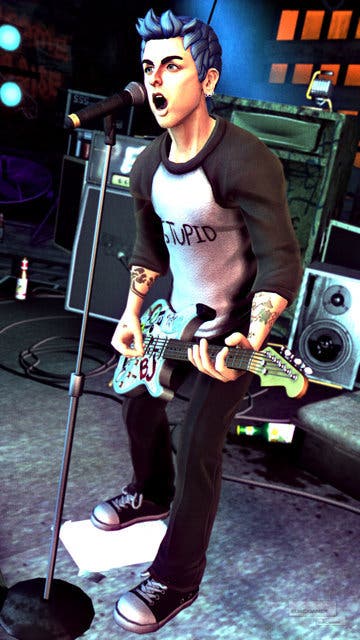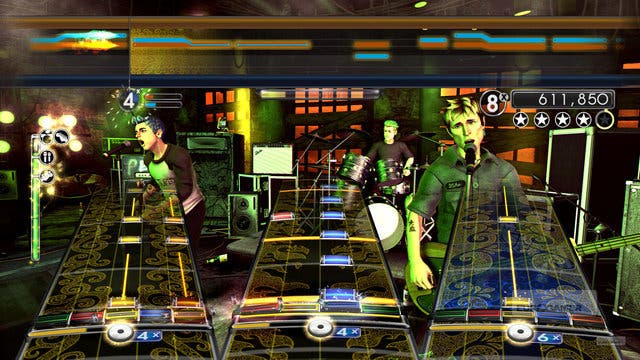Green Day: Rock Band
Punk chore?
Similarly there's a palpable drama to the climax of a track like Boulevard Of Broken Dreams, with flames bursting from the stage and the camera panning wildly around as that menacing coda with its irregular loop of chords plays out. This is not just the Green Day instalment, but the entire series at its majestic best.
This contrasts sharply, in particular, with The Warehouse, with its drab, charmless aesthetics; and the Fox Theatre, despite its fancy light displays and monochrome sequences, feels deflating after the wide-eyed adrenaline surge of Milton Keynes (a sentence I never expected to write in any medium).
It's a pity, then, that more outdoor stadia couldn't have been worked into the game. As it is, after the global whistle-stop tour and dream sequences of The Beatles: Rock Band, this feels like being short-changed.
Difficulty-wise, expert axe-wielders will be challenged rather than overwhelmed by the game's trickier numbers, largely due to the chord-driven nature of the band's arrangements, with the test (particularly with early material) one of endurance rather than digital dexterity. The same broadly applies to drums; meanwhile for karaoke kings, Billie Joe's vocal range is narrower than that of many of his peers, which should come as a blessing to gamers and terrorised neighbours alike.

When the game was announced, many questioned whether Green Day had the depth, breadth and quality of material to sustain a full game. As a fan of 'the hits', but someone who could never be described as a hardcore follower, I would answer yes without any serious reservations.
For a punk three-piece, there's a pleasing spread of moods, tempos and tones here, from the runaway-train chippiness of much of the early output to the earnest croon of Last Night On Earth and the affecting simplicity of Good Riddance (Time of Your Life). And the structural versatility of the more grandiose numbers, like the widescreen sprawl of Homecoming, offers self-contained dramas that are great fun to play through as a group.
Incidentally, one of the few issues I had with The Beatles: Rock Band was that the massively varied instrumentation used in the recordings at times exposed the limitations of the game, which remained forlornly anchored to its toy guitars and drums.
There are no such problems with Green Day's oeuvre, which Rock Band fits around like a glove and rarely feels like it has to compromise to maintain the illusion (playing cello parts on the bass is pretty much the extent of it). So while Green Day: Rock Band is far less ambitious than its predecessor, it is perhaps more comfortable in its skin.
The feature set is regulation Rock Band fare, both online and offline, and support for two- and three-part vocal harmonies has been carried over from the Beatles version (mostly two-part at best here, though). Existing instruments remain cross-compatible, of course, and tracks can be exported into other versions of the game.

Overall, Green Day devotees should have little to complain about here (aside from perhaps the gaps in the catalogue). As fan service it crowd surfs into the living room with ample generosity and verve. But, irrespective of one's tastes, next to the breathtaking attention to detail of The Beatles project, as a celebration of a group's creative output the package feels a little insubstantial.
That said, if you're a Green Day fan it's a no-brainer - an already excellent music game with a disc full of the music you love - and for that you can happily add a point to the score. Otherwise, as intoxicating as the experience can be at times, with Rock Band 3 and the innovations that may bring (keytar, please!) on the horizon, the question of whether to buy now or wait becomes a more difficult one to answer.

